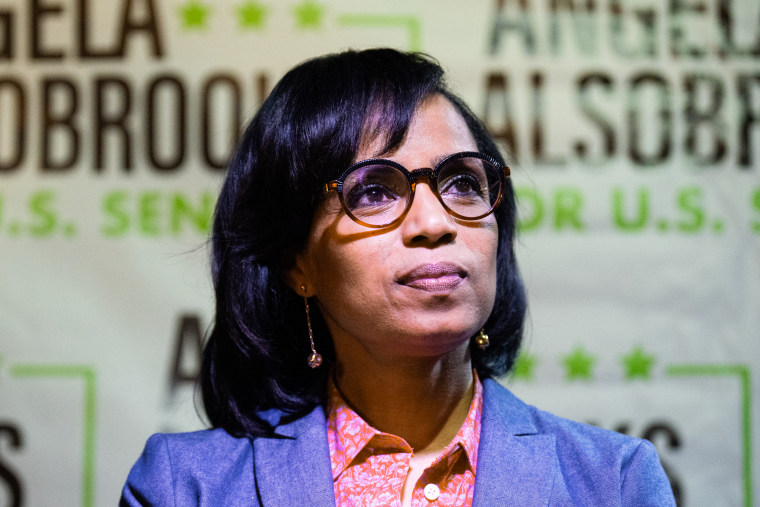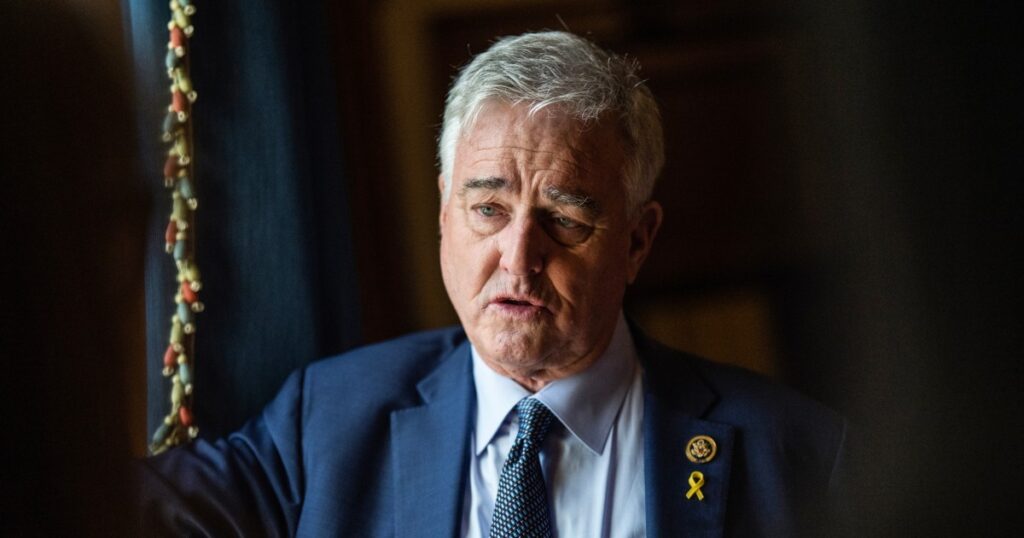Wealthy candidates for office spent more money than ever before to run for Congress last year, and now the biggest of them face a key hurdle.
Democratic Rep. David Trone has spent more than $57 million of his own money on his Maryland senatorial bid ahead of next week's primary, a staggering sum that already ranks among the largest privately funded campaigns in U.S. history. But Trone isn't alone: Privately funded candidates have spent $131 million on their campaigns in 2023, more than in any odd-numbered year since at least 2003, according to an NBC News review of campaign finance records.
That's part of a recent surge in spending by wealthy candidates — including about $37 million spent by Trone last year alone — that has fundamentally changed how races are won and lost. It also may have made it harder than ever for those who aren't wealthy to get to Washington, because candidates are not bound by contribution limits and can give unlimited amounts to their own campaigns.
The trend is affecting everything from open primaries in Republican- and Democratic-heavy districts across the country to Senate races. Trone continues to spend heavily, including on ads featuring high-profile allies like state Attorney General Anthony Brown, in an effort to win the Democratic primary for retiring Sen. Ben Cardin's seat. But before that, he'll face a tough fight in November against former Republican Gov. Larry Hogan. Also fighting hard for the Democratic nomination is Prince George's County Mayor Angela Alsobrooks, who has the backing of leading Maryland Democrats but is outfunded 9-to-1 by Trone.

“I don't believe this is how democracy works. I believe these campaigns need reform,” Alsobrooks said at an April debate hosted by Baltimore's WBFF-TV, criticizing Trone's self-funding and calling her fundraising evidence of her “broad and growing coalition.” She added, “Money can't buy love. Money can't buy Maryland.”
Trone countered by arguing that relying on his own wealth means he's not tied down to big donors. During the debate, he listed the corporate political action committees that have given money to Alsobrooks in the past and questioned whether those companies have America's best interests in mind.
“We have to get money out of politics, which is really poisoning our system. I'm the only candidate on this stage who hasn't taken money from Exxon. I don't think they're helping us on the environmental issue,” he said.
In a statement to NBC News, Trong's spokesman, Onotse Omoyeni, echoed Trong's comments at the debate and said he “rejects funding from special interests that pay career politicians who stand in the way of progress.”
“In the Senate, the president is not just denying funds. He has already introduced major reforms to our electoral system, removing all dark money and special interest funding from our elections,” Omoyeni added.
Tron Leads Large Self-Funded Group
Trone's eye-popping spending is part of a long pattern for the Total Wine & More co-owner and ultra-wealthy businessman: Between 2015, before he announced his Senate run, and 2022, he loaned about $46 million to his own campaigns, including $13 million for his first House race, when he lost a primary for an open Democratic-leaning seat adjacent to Washington, D.C. He spent even more money in 2018 to win his current district.
But Trone's self-funded campaign is just the biggest example of a broader trend in congressional races: Candidates are contributing $61 million to the 2023 House races and $70 million to the Senate races, with nearly half of that going to Trone's Senate campaign.
The top self-funded 2023 U.S. Senate candidates were Republican Sen. Matt Dolan of Ohio ($7 million) and Republican Sen. Rick Scott of Florida ($3.5 million), followed by Republican Sen. Bernie Moreno of Ohio, who defeated Dolan in the Republican Senate primary earlier this year ($3 million).
The seven other Senate candidates whose campaigns are still ongoing all received seven-figure checks last year: six Republicans (Robin Ficker of Maryland, Brad Wilson of Utah, Keith Gross of Florida, Tim Sheehy of Montana, Sandy Pensler of Michigan and Dave McCormick of Pennsylvania) and one Democrat (Stanley Campbell of Florida).
Last year, 17 House candidates donated at least $1 million to their campaigns. Former Rep. Gil Cisneros (D-Calif.) lent $2.4 million to his campaign to fund his bid to return to Congress, and Rep. Shuri Thanedar (D-Mich.) donated more than $2 million to his campaign.
Self-financing of congressional elections has increased fairly steadily in recent years, with a dramatic increase since the early 2000s.
In 2003, congressional candidates loaned about $14.6 million to their campaigns. The amount of out-of-year self-funding ballooned to more than $62 million, rising to about $22 million in 2005 and $36 million in 2009, at the start of the Republican Tea Party wave following the election of President Barack Obama.
Self-funding then decreased, but increased again when well-known businessman Donald Trump took the White House. Wealthy candidates spent about $93 million on House and Senate races in 2017, $64 million in 2019, and then increased significantly to about $126 million in 2021 and $131 million in 2023.
Similarly, the number of candidates willing to put money into their campaigns early is on the rise: 11 Senate candidates have committed at least $1 million to themselves in the off-campus year, more than in every other year except 2021 (13), and 17 House candidates have committed at least $1 million to themselves, also a record high.
This early infusion of personal wealth doesn't necessarily determine whether a race is won or lost: Of the 90 House candidates who contributed at least $1 million to their campaigns in the last year of their election since 2003, only 11 won their House or Senate races.
That's about 12 percent, a relatively low overall success rate, but far more impressive when you consider that thousands of congressional elections are held each year, most of which are lost. And it doesn't even include candidates who take out seven-figure loans to their campaign coffers in the same election year, as Trone did in his multiple runs for Congress.
Relying on personal wealth early in the process can be a key accelerator for campaigns, giving them the ability to quickly ramp up staffing, messaging, advertising and more without waiting to build up a fundraising infrastructure.
That's one reason why self-funding is especially attractive for non-incumbent candidates: A recent OpenSecrets analysis found that 88% of self-funding in 2023 went to candidates or challengers running for open seats, not incumbents. That percentage includes Trone, who is running for an open Senate seat. But even without him, the majority of self-funding is by candidates running for open seats or challengers running against incumbents.

